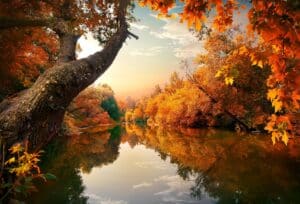One must have a mind of winter
To regard the frost and the boughs
Of the pine-trees crusted with snow;
And have been cold a long time
To behold the junipers shagged with ice,
The spruces rough in the distant glitter
Of the January sun; and not to think
Of any misery in the sound of the wind,
In the sound of a few leaves,
Which is the sound of the land
Full of the same wind
That is blowing in the same bare place
For the listener, who listens in the snow,
And, nothing himself, beholds
Nothing that is not there and the nothing that is.
–The Snow Man, by Wallace Stevens
Pausing along a snowy mountain pass in Winter, life appears to have stopped. Any sound of movement rings with clarity in the silent landscape: the icy crunch of my boots on the frost-covered road, the rushing current of ice-rimmed Minam River, the sloughing of wind in the snow-crusted pines.
One might find this frozen landscape harsh and miserable. It appears barren, stripped of leaves and lifeless. No bird flits in the ice-shagged bush. No trout jumps in the glittering stream. The pale sun brings no warmth.
The sun, the essence of yang energy and the active aspect, recedes to its furthest in winter, with long nights and short days. Yin energy, the receptive aspect, is at its maximum. Chinese Five Element acupuncture associates this time of year with the Water Element. Like a snow-covered landscape, the nature of Water is elusive, impenetrable and hidden.
The mind of winter looks and listens deeply, beholding nothing that is not there. Life has not stopped. It has slowed down, gone below the surface and waits, dormant. Animals slow down and hibernate. The sap of trees moves to the root. Seeds and nuts, fallen in the autumn, lie hidden beneath soil and rotten leaves. An ocean of snow covers the details of the surface. Larger features of the land — the folds of the hills, the silhouettes of trees — stand out in emphasis.
Life in this slow-moving, dark world is concentrated down to the essentials. The mind of winter beholds the potency of the seed. An entire life cycle lies packed in a tiny hull, awaiting the warmth of spring to trigger the release of its hidden potential. The miracle of winter is that plants and animals do endure through this harsh and rigorous season. The inner spirit of the Water Element is a rugged determination and will to endure through difficult times.
Water, like winter, is full of potential energy held in reserve. The snow on the mountain is itself a reservoir of water, to be released in the spring melts, flooding the rivers and streams. Water is also about survival. It is vital to human life, and we can only live for a short time without an adequate amount. For millennia humans have sought to control the flow of water with dams, reservoirs and irrigation, to ensure a steady supply. Water is also powerful and dangerous. Too much or too little brings disaster: floods, tsunamis, hurricanes and droughts. For this reason, Chinese Five Element acupuncture associates the Water Element with the emotion of fear.
Like the plants and animals, the energy of the human body-mind-spirit returns to the root in winter. You may find that you feel more tired, depressed, or bothered by aches and pains at this time of year. In practical terms, this is a time to get extra rest and build up reserves. Don’t push for visible, outward results. Trust that the work is happening inside and, like the dormant seed, will bring forth a vigorous spring.
Be cautious how you use your resources, for winter is a time of survival. This is not a time to over-extend yourself or take on extra projects and work.
Winter is also a time for clarity and introspection. Although the winter landscape may seem barren and lifeless, we can see the lay of the land more clearly than at any other time of year. Likewise, our inner landscape lies bare and open to self-examination. Situations and relationships that do not serve us may stand out as starkly as dead trees on a snowy hill. The inner view may be disagreeable, but it holds the opportunity for healing and transformation.
The mind of winter beholds all this — the bare, frozen and harsh places in the landscape of the soul– and listens without misery to the sound of the wind that blows through the painful, the wounded and the broken parts of being. The mind of winter beholds, accepting and not judging, nothing that is not there, and the nothing that is.



